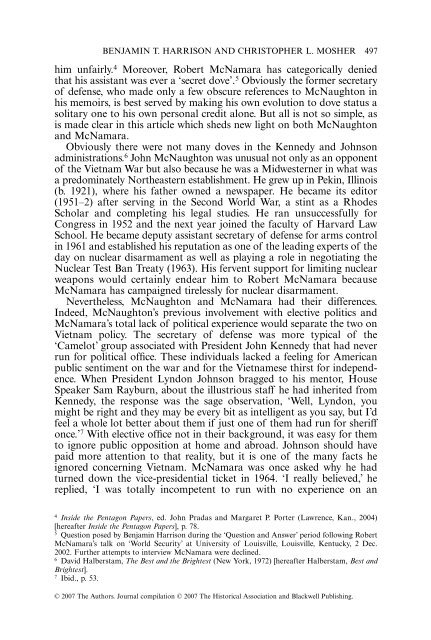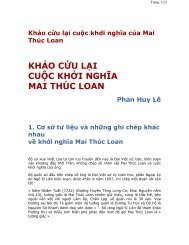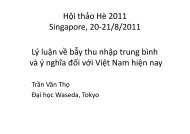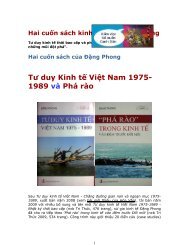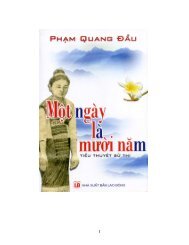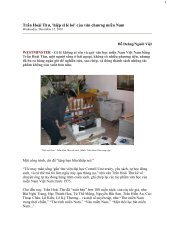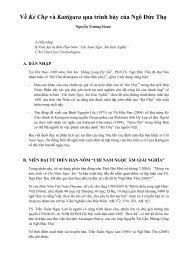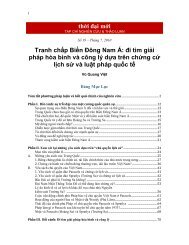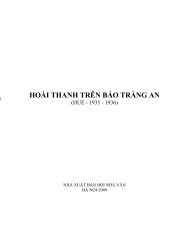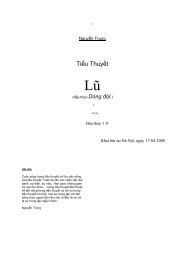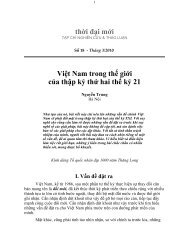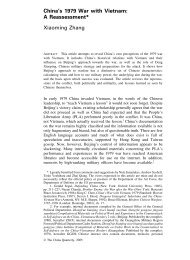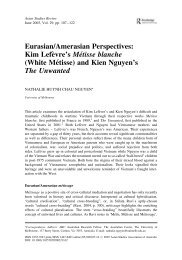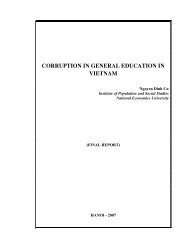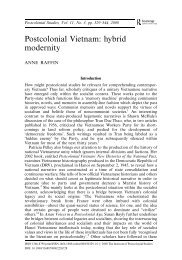John T. McNaughton and Vietnam: The Early Years as ... - Viet-studies
John T. McNaughton and Vietnam: The Early Years as ... - Viet-studies
John T. McNaughton and Vietnam: The Early Years as ... - Viet-studies
Create successful ePaper yourself
Turn your PDF publications into a flip-book with our unique Google optimized e-Paper software.
BENJAMIN T. HARRISON AND CHRISTOPHER L. MOSHER 497<br />
him unfairly. 4 Moreover, Robert McNamara h<strong>as</strong> categorically denied<br />
that his <strong>as</strong>sistant w<strong>as</strong> ever a ‘secret dove’. 5 Obviously the former secretary<br />
of defense, who made only a few obscure references to <strong>McNaughton</strong> in<br />
his memoirs, is best served by making his own evolution to dove status a<br />
solitary one to his own personal credit alone. But all is not so simple, <strong>as</strong><br />
is made clear in this article which sheds new light on both <strong>McNaughton</strong><br />
<strong>and</strong> McNamara.<br />
Obviously there were not many doves in the Kennedy <strong>and</strong> <strong>John</strong>son<br />
administrations. 6 <strong>John</strong> <strong>McNaughton</strong> w<strong>as</strong> unusual not only <strong>as</strong> an opponent<br />
of the <strong><strong>Viet</strong>nam</strong> War but also because he w<strong>as</strong> a Midwesterner in what w<strong>as</strong><br />
a predominately Northe<strong>as</strong>tern establishment. He grew up in Pekin, Illinois<br />
(b. 1921), where his father owned a newspaper. He became its editor<br />
(1951–2) after serving in the Second World War, a stint <strong>as</strong> a Rhodes<br />
Scholar <strong>and</strong> completing his legal <strong>studies</strong>. He ran unsuccessfully for<br />
Congress in 1952 <strong>and</strong> the next year joined the faculty of Harvard Law<br />
School. He became deputy <strong>as</strong>sistant secretary of defense for arms control<br />
in 1961 <strong>and</strong> established his reputation <strong>as</strong> one of the leading experts of the<br />
day on nuclear disarmament <strong>as</strong> well <strong>as</strong> playing a role in negotiating the<br />
Nuclear Test Ban Treaty (1963). His fervent support for limiting nuclear<br />
weapons would certainly endear him to Robert McNamara because<br />
McNamara h<strong>as</strong> campaigned tirelessly for nuclear disarmament.<br />
Nevertheless, <strong>McNaughton</strong> <strong>and</strong> McNamara had their differences.<br />
Indeed, <strong>McNaughton</strong>’s previous involvement with elective politics <strong>and</strong><br />
McNamara’s total lack of political experience would separate the two on<br />
<strong><strong>Viet</strong>nam</strong> policy. <strong>The</strong> secretary of defense w<strong>as</strong> more typical of the<br />
‘Camelot’ group <strong>as</strong>sociated with President <strong>John</strong> Kennedy that had never<br />
run for political office. <strong>The</strong>se individuals lacked a feeling for American<br />
public sentiment on the war <strong>and</strong> for the <strong><strong>Viet</strong>nam</strong>ese thirst for independence.<br />
When President Lyndon <strong>John</strong>son bragged to his mentor, House<br />
Speaker Sam Rayburn, about the illustrious staff he had inherited from<br />
Kennedy, the response w<strong>as</strong> the sage observation, ‘Well, Lyndon, you<br />
might be right <strong>and</strong> they may be every bit <strong>as</strong> intelligent <strong>as</strong> you say, but I’d<br />
feel a whole lot better about them if just one of them had run for sheriff<br />
once.’ 7 With elective office not in their background, it w<strong>as</strong> e<strong>as</strong>y for them<br />
to ignore public opposition at home <strong>and</strong> abroad. <strong>John</strong>son should have<br />
paid more attention to that reality, but it is one of the many facts he<br />
ignored concerning <strong><strong>Viet</strong>nam</strong>. McNamara w<strong>as</strong> once <strong>as</strong>ked why he had<br />
turned down the vice-presidential ticket in 1964. ‘I really believed,’ he<br />
replied, ‘I w<strong>as</strong> totally incompetent to run with no experience on an<br />
4 Inside the Pentagon Papers,<br />
ed. <strong>John</strong> Prad<strong>as</strong> <strong>and</strong> Margaret P. Porter (Lawrence, Kan., 2004)<br />
[hereafter Inside the Pentagon Papers], p. 78.<br />
5 Question posed by Benjamin Harrison during the ‘Question <strong>and</strong> Answer’ period following Robert<br />
McNamara’s talk on ‘World Security’ at University of Louisville, Louisville, Kentucky, 2 Dec.<br />
2002. Further attempts to interview McNamara were declined.<br />
6 David Halberstam, <strong>The</strong> Best <strong>and</strong> the Brightest (New York, 1972) [hereafter Halberstam, Best <strong>and</strong><br />
Brightest].<br />
7 Ibid., p. 53.<br />
© 2007 <strong>The</strong> Authors. Journal compilation © 2007 <strong>The</strong> Historical Association <strong>and</strong> Blackwell Publishing.


